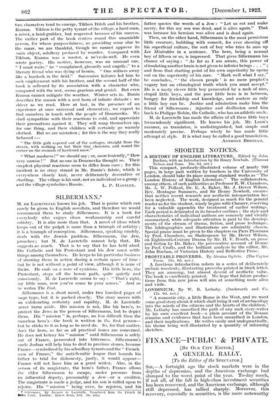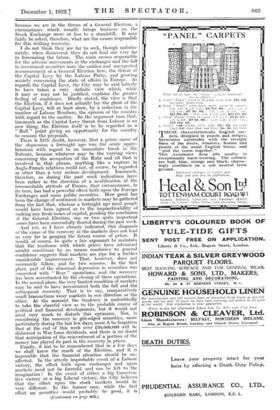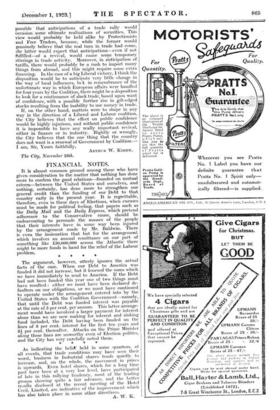FINANCE-PUBLIC & PRIVATE.
[By OUR CITY EDITOR.] A GENERAL RALLY. [To the Editor of the SPECTATOR.] SIR,—A fortnight ago the stock markets were in the depths of depression, and the American exchange had slumped to the worst point of the year. To-day much, if not all, of the fall in high-class investment securities has been recovered, and the American exchange, although still depressed, has rallied sharply. Moreover, this recovery, especially in securities, is the more noteworthy because we are in the throes of a General Election, a circumstance which usually brings business on the Stock Exchange more or less to a standstill. It may fairly be asked, therefore, what are the causes responsible for this striking recovery. I do not think they are far to seek, though unfortu- nately, when discovered, they do not lead one very far in forecasting the future. The main causes responsible for the adverse movements in the exchanges and the fall in investment securities were the sudden and unexpected announcement of a General Election here, the threat of the Capital Levy by the Labour Party, and growing anxiety concerning the state of affairs in Europe. As regards the Capital Levy, the City may be said latterly to have taken a very definite view which, while it may or may not be justified, explains the greater feeling of confidence. Briefly stated, the view is that the Election, if it does not actually lay the ghost of the Capital Levy, will at least show, by a reduction in the number of Labour Members, the opinion of the country with regard to the matter. So the argument runs that, inasmuch. as the Capital Levy threat from Labour is no new thing, the Election itself is to be regarded as a " Bull " point giving an opportunity for the country to censure the proposals. There is little doubt, however, that a prime cause of the depression a fortnight ago was the acute appre- hensions with regard to an immediate break in the Entente, because whatever may be the varying views concerning the occupation of the Ruhr and all that is involved in that phrase, anything like a rupture in Anglo-French relations could not, of course, be regarded as other than a very serious development. Inasmuch, therefore, as during the past week indications have been rather in the direction of a modification of the irreconcilable attitude of France, that circumstance, in its turn, has had a powerful effect both upon the Foreign Exchanges and upon public securities. How great has been the change of sentiment in markets may be gathered from the fact that, whereas a fortnight ago most people would have been agreed as to the impracticability of making any fresh issues of capital, pending the conclusion Df the General Election, one or two quite important :ssues have been successfully floated during the past week. And yet, as I have already indicated, this diagnosis of the cause of the recovery in the markets does not lead us very far in gauging the future course of prices. It would, of course, be quite a fair argument to maintain that the readiness with which prices have advanced amidst conditions by no means conducive to general confidence suggests that markets are ripe fox a further considerable improvement. That, however, does not necessarily follow, and for two reasons. In the first place, part of the abnormal depression in securities was connected with " Bear " operations, and the recovery has been accentuated by the closing of these operations. In the second place, the very limited condition of markets may be said to have accentuated both the fall and the subsequent recovery. That is to say, comparatively small transactions sway markets in one direction or the other. At the moment the tendency is undoubtedly to take the cheerful view as to the probable course of political and financial developments, but it would not need very much to disturb this optimism. Nor, in considering the recovery in gilt-edged securities, more particularly during the last few days, must it be forgotten that at the end of this week over £50,000,000 will be disbursed in War Loan dividends, and there is no doubt that anticipation of the reinvestment of a portion of the money has played its part in the recovery in prices. Finally, it has to be remembered that in a few days we shall know the result of the Election, and it is impossible that the financial situation should be un- affected. In the utterly improbable event of a Labour victory, the effect both upon exchanges and upon markets need not be foretold, and can be left to the imagination ! In the event of either a big Conserva- tive victory or a big Liberal victory, the City believes that the effect upon the stock markets would be very different. In the former case, while the first effect on securities would probably be good, it is (Continued on page 80g.) possible that anticipations of a trade rally would occasion- some ultimate realizations of securities. This view. would probably be held alike by Protectionists and Free Traders, because, while the former would genuinely believe that the real turn in trade had come, the latter would expect that anticipations—even if not fulfilled—of a revival, would cause some temporary stirrings in trade activity. Moreover, in anticipation of tariffs, there would probably be a rush to import many things from abroad, and this might require some extra financing. In the case of a big Liberal victory, I think the disposition would be to anticipate very little change in the way of local influences, bit, in remembrance of the unfortunate way in which European affairs were handled for four years by the Coalition, there might be a disposition to look for a continuance of slack trade, based upon want of confidence, with a possible further rise in gilt-edged stocks resulting from the inability to use money in trade. If, on the other hand, matters were to shape in any way in the direction of a Liberal and Labour coalition, the City believes that the effect on public confidence would be highly injurious, and without public confidence it is impossible to have any really important revival, either in finance or in industry. Rightly or wrongly, the City believes that the one thing that the country does not want is a renewal of Government by Coalition.— I am, Sir, Yours faithfully, The City, November 28th. ARTHUR W. KIDDY.




























































 Previous page
Previous page